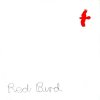Jóhann Jóhannsson - Arrival [Original Film Score] (2016):
01 Arrival
02
Heptapod B
03 Sapir-Whorf
04 Hydraulic Lift
05
First Encounter
06 Transmutation at a Distance
07 Around the Clock News
08
Xenolinguistics
09
Ultimatum
10 Principle of Least Time
11 Hazmat
12
Hammers and Nails
13 Xenoanthropology
14
Non-Zero-Sum Game
15 Properties of Explosive Materials
16 Escalation
17
Decyphering
18 One of Twelve
19 Rise
20
Kangaru
Genre(s): Film score, ambient
This is the second score to one of Denis Villeneuve's films that I have picked in the bonus round. The first,
Blade Runner 2049, was no doubt Villeneuve's prize to direct after his string of excellent films preceding it, including 2016's
Arrival, a masterpiece of contemplative science fiction adapted from an equally brilliant short story by Ted Chiang.
Icelandic composer Jóhann Jóhannsson crafted the score for
Arrival, as well as for Villeneuve's tense 2015 drug cartel thriller
Sicario. He was also Villeneuve's original choice to compose the score for
Blade Runner 2049, but as I wrote in my description for that film's score, Villeneuve eventually sought a different direction for the score, parting ways with Jóhannsson and enlisting Hans Zimmer and Benjamin Wallfisch to compose a score that was more in line with Villeneuve's vision for the film. The final score to
Blade Runner 2049 is tremendous, and Zimmer/Wallfisch presented a cohesive vision that was far better than I could have hoped for, given the esteem in which I hold Jóhann Jóhannsson.
Arrival is a film about dislocation, about striving to communicate through layers of complex emotion and ambiguity. As such, it required a score that would effectively transmit the feeling of being unsettled by that which we do not or cannot understand. Jóhannsson's work on the film is deeply atmospheric, brooding, and eerie. It is also occasionally uplifting and painterly. The score perfectly complements the tonal qualities that Villeneuve and director of photography Bradford Young achieved with their color palette, lighting, and lensing choices.
Of his impressionistic approach to scoring film, Jóhannsson has said, "people are hungry for new sounds, and for the experience of listening to unfamiliar music that you don't hear on commercials and in every TV show." I admire this particular attitude, that listeners can be moved by the unfamiliar if the creator trusts them enough to be challenged. On
Arrival, specifically, Jóhannsson has said:
“Arrival is my third film with Denis, and we’ve developed a trust and knowledge of each other’s tastes and sensibilities. Denis always involves me in the pre-production stage: I read the script and we talk about the mood and the role that the music needs to play. With Arrival, we didn’t talk much about the music and this was deliberate on his part; he basically gave me carte blanche to experiment.
I knew that I wanted to use voices as one of the prime instruments in the score of a film that is primarily about language and communication. But I wanted to use the voice in a different way, so I worked with an ensemble called Theatre of Voices. They're masters of both early music and contemporary music, so they have a very good command of exotic vocal techniques. I worked with Robert Aiki Aubrey Lowe; he is not academically trained, but his voice is an amazing, powerful and flexible instrument.
In terms of voices, I was very influenced by Stockhausen's Stimmung, a piece for six voices and microphones. But I was also listening a lot to spectral composers like Gérard Grisey and Horatiu Rădulescu. In mainstream cinema, there's usually too much music. In Arrival, the use of space and silence is extremely important. When music is needed, it’s really there and it serves a purpose.
I try to approach a project with a blank slate and just let things emerge. I start very early in the process because it takes a lot of time to work in this way. It takes time to find a mood and feel that has some character and individuality, and is not weird for weirdness’s sake."
Jóhann Jóhannsson's score for
Arrival should have been nominated for an Academy Award, but the score relied on a beautiful piece of music by Max Richter called
"On the Nature of Daylight" in a few key scenes, and was therefore disqualified on the grounds that Jóhannsson's score was "diluted by the use of pre-existing music." It's bullsh*t, but it's one of the Academy's rules. Regardless, the score was, in my opinion, the best of 2016, and I heartily recommend it to those who are hungry for the new.
On a more tragic note, I should mention that Jóhannsson passed away in early 2018 at the age of 48. Toxicology reports indicate that a lethal combination of cocaine and flu medication are likely what contributed to his untimely death. I know not the source of Jóhannsson's apparent drug habit, but his death leaves a gaping hole in the world of contemporary classical music. Part of me desires very much to hear whatever work Jóhannsson had completed on
Blade Runner 2049 prior to his departure from that film, if only to know how his brilliant mind would have interpreted the images to my favorite film of the last decade.
R.I.P. Jóhann.









